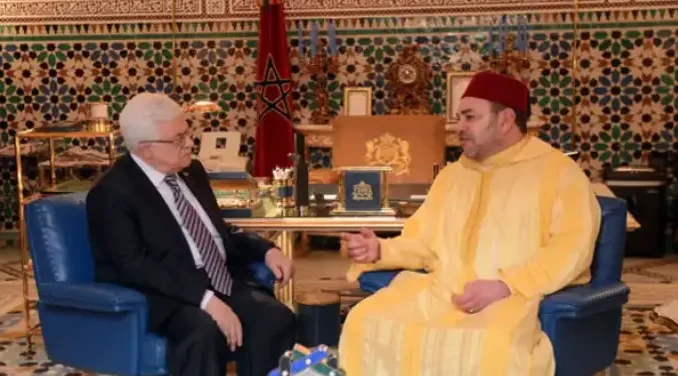
King Mohammed VI of Morocco has warned that the stalemate in the Palestinian-Israeli peace process gives radicals an opportunity to exacerbate the conflict, stir up religious feelings, and increase tension and agitation in the city of al-Quds.
The warning came in a message that King Mohammed VI, Chairman of the Al-Quds Committee, addressed to the participants in the High-Level Conference on the Protection and Support of the City of Al-Quds held in Cairo Sunday.
In his message, King Mohammed VI reiterated Morocco’s unwavering commitment to the Palestinian cause and to al-Quds, pointing out that he considers the Palestinian cause just as important as the Kingdom’s foremost national cause.
“The Kingdom of Morocco’s participation in today’s conference attests to my country’s renewed commitment to the Palestinian cause in general, and to al-Quds in particular, in keeping with my sacred duty as Chairman of the Organization of Islamic Cooperation’s al-Quds Committee. Indeed, the Palestinian cause is just as important to me as my country’s foremost national cause. As it has been pointed out on various occasions, it is also one of the enduring pillars of our foreign policy,” states the Sovereign in the message that was read out by Head of Government Aziz Akhannouch.
The King who underlined the special meaning of this conference as it is taking place at a difficult juncture as regards the Palestinian cause and the question of al-Quds and of Islamic and Christian holy shrines there, foremost of which is the blessed Al-Aqsa Mosque, called on Arab states to close ranks, take joint action, and shoulder a collective responsibility in order “to face up to the violations committed in the Holy City, and the attempts to obliterate its unique cultural identity and change its legal character, which the relevant UN Security Council resolutions have pledged to protect.”
“The unilateral measures designed to create illegitimate facts on the ground in al-Quds and its surroundings represent a threat to the city’s legal status, its demographic make-up, and its historical character, which is rooted in a diversity of cultures and faiths,” the Sovereign pointed out, warning that the systematic measures taken do not help build trust. “Rather, they undermine the chances of reaching a permanent solution based on two states living side by side, in peace and security.”
The King underlined further that the difficult reality prevailing in al-Quds cannot be considered separately from the general context relating to the evolution of the Palestinian cause.
“The interruption of negotiations between the Israeli and Palestinian sides, and the continuing impasse and stalemate in the peace process, give radicals an opportunity to exacerbate the conflict, stir up religious feelings, and increase tension and agitation in the city of al-Quds. As a result, there is a risk that this political conflict might turn into an ideological one, with potentially dire consequences for the entire region,” the Sovereign stated in his message.
He made it clear that protecting the city of al-Quds from plans to change its historical and legal status should be an honest and sincere endeavor, far from empty slogans, useless outbidding tactics, and narrow-minded calculations, calling for effective diplomatic actions and actual work on the ground, inside the Holy City.
Calling for the need for concerted Arab and Islamic efforts to protect and support the Holy City, and to facilitate a political détente that can open up prospects for optimism, so that peace, security and prosperity would prevail in the region, the King explained that commitment to the principles of coexistence and the perception of cultural, religious or sectarian differences as common sources of enrichment, would bring communities together, rather than separate them.
The King recalled in this vein the “Al-Quds Appeal” he signed in Rabat on 30 March 2019, with Pope Francis, in which they stressed that it was “important to preserve the Holy City of Jerusalem / Al-Quds Acharif as the common patrimony of humanity and especially the followers of the three monotheistic religions, as a place of encounter and as a symbol of peaceful coexistence, where mutual respect and dialogue can be cultivated.”
“With that in mind, I reiterate the call for setting up a global alliance of all driving forces that are committed to peace and that believe in the values of tolerance and coexistence. The aim is to save the City of Peace and preserve its common cultural and human heritage, in keeping with the appeal I made in Rabat, in 2009, on the occasion of the International Conference on al-Quds,” King Mohammed VI stated.
The Sovereign vowed that Morocco, convinced that peace in the Middle East region remains an inescapable strategic option, “will keep up its efforts and leverage its capabilities and its outstanding relations with all the influential international parties and powers so as to contribute to any international effort aimed at re-launching dialogue and negotiations. That is, indeed, the only way to put an end to the conflict and achieve security, stability and prosperity in the Middle East region.”
In his message, King Mohammed VI also surveyed the tangible field work carried out for more than 25 years by the Bayt Mal al-Quds al-Sharif Agency, which is the operational branch of the OIC al-Quds Committee, to support the Holy City and preserve its cultural specificity through the implementation of social and development projects that concern all segments of the City’s population.
The Agency has managed to implement more than 200 projects, at an estimated cost of about $65 million, a funding totally provided by the Moroccan state (70 percent of the budget) and contributions from institutions and individuals.
